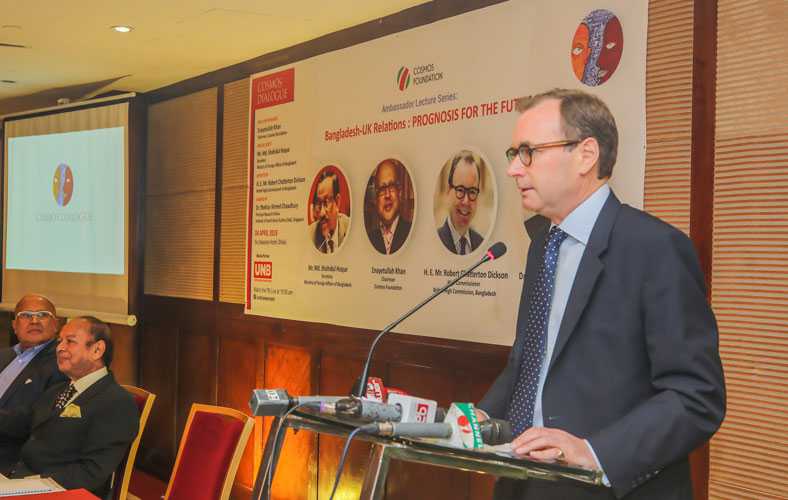UK high commissioner: Bangladesh a developing giant on world stage

'The political relationship has huge potential as Bangladesh assumes its rightful place as a developing giant on the world stage'
Describing Bangladesh as a developing giant on the world stage, British High Commissioner Robert Chatterton Dickson on Thursday said the UK wants a stronger political partnership with the South Asian nation.
"The political relationship has huge potential as Bangladesh assumes its rightful place as a developing giant on the world stage," he said at Cosmos Dialogue at a city hotel.
He said the two countries can work together to tackle global challenges and deliver global opportunities, reports UNB.
"We are keen to broaden the UK-Bangladesh relationship, building on Bangladesh's economic success story," the high commissioner said.
Dickson said Britain will be looking towards the fast-growing economies of South Asia, including Bangladesh, for new partnerships after Brexit.
He pointed out that a more balanced UK-Bangladesh trade relationship will be a good thing for both sides.
The high commissioner said the UK and Bangladesh can work together at the UN and within the Commonwealth on issues such as climate change and support open and free international trade.
Cosmos Foundation organized "Bangladesh-UK Relations: Prognosis for the Future" symposium as part of the second edition of its Ambassador Lecture Series.
Cosmos Foundation Chairman Enayetullah Khan delivered the welcome address at the event held with Iftekhar Ahmed Chowdhury, Principal Research Fellow, Institute of South Asian Studies, National University of Singapore, in the chair.
"We are bound by cricket and culture, language and literature, common visions, and values that complement our political and economic relations," said Khan highlighting the deep emotional ties Britain and Bangladesh share.
Iftekhar said Bangladesh is now viewed as a rising economic powerhouse and that its potentials, not just in the blue economy but also in the Indo-pacific maritime milieu, are burgeoning.
High Commissioner Dickson said the UK will be working alongside the Bangladeshi High Commission in London to highlight the opportunities in Bangladesh for British companies.
A country with 165 million potential consumers growing 8% per year ought to be an attractive proposition for business, he noted.
"Serious efforts to address the issues making business in Bangladesh difficult will be a good way to attract private capital involvement that the Bangladesh economy is going to need as it matures and becomes a larger player on the world stage," he said.
As Bangladesh is set to achieve middle-income status in the next few years, Dickson said the UK's assistance is likely to evolve from helping basic development to technical assistance with the economic and governance reform needed to continue progress.
"We'll be highlighting the partnership and the UK's unique role here during the celebration of Bangladesh's 50th birthday in 2021. That's the future trajectory as the high commission sees it, helping Bangladesh deliver on the 2021 agenda and entering the next 50 years as a global economic force," he added.
'Rohingya problem made in Myanmar'
Dickson said the Rohingya issue is something that Bangladesh had nothing to do with but the country has been "unbelievably generous."
"It's a problem made in Myanmar," he said, where Rohingyas, left out of the citizenship law, suffer a "basic injustice."
Bangladesh is currently hosting more than 1.1 million Rohingyas. Over 700,000 of them fled here since August 2017 after the Myanmar military launched a brutal offensive targeting the mainly-Muslim ethnic minority.
The high commissioner said Myanmar has participated in ethnic cleansing. "It's a problem for the Rohingyas...[and] obviously for Bangladesh... [and] also for Myanmar."
Although Bangladesh and Myanmar signed repatriation deals, there has been very little progress.
Dickson said the UK has a role and that the Department for International Development (DFID) has provided 130 million pounds worth of humanitarian support and promised to provide more.
"We're having conversations about ways in which we can help everybody resolve this very difficult problem, which is just as bad for everybody, including, we'd argue strongly, the government of Myanmar," the high commissioner said.
Noted foreign affairs experts and businesspersons, including Inam Ahmed Chowdhury, Prof Selina Mohsin, Lt Gen (retd) ATM Zahirul Alam, AK Khan Foundation Trustee Secretary Salahuddin Kasem Khan, Advanced Chemical Industries Limited Director Juned Ahmed Choudhury, Mohammadi Group Managing Director Rubana Huq, Dhaka University's Honorary Professor Dr Shakhawat Ali Khan, and other former diplomats spoke on the occasion.
They focused on security, defence, and education cooperation between the two countries.
Commonwealth and current global issues, including the Rohingya crisis and climate change, were also part of the discussions.
Source: https://www.dhakatribune.com
Previous Story
- How big tobacco keeps cancer rates high in...
- UK parliament calls for antitrust, data abuse probe...
- Bangladesh calls for fair prices for garment items
- Nintendo UK Is Presenting an Indie Highlights Presentation...
- IPI will demand justice in the murder of...
- Disabled train users app 'life-changing'
- Edible oil export rises
- Industry news in brief